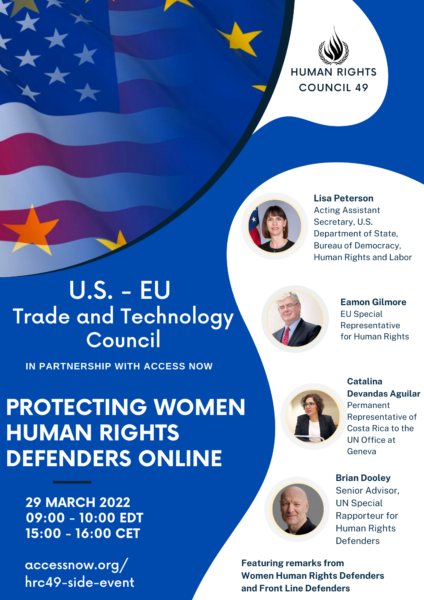HRC49 Side Event: Protecting Women Human Rights Defenders Online
49th regular session of the Human Rights Council (HRC49)
EU – US Trade and Technology Council Side Event:
‘Protecting Women Human Rights Defenders Online’
Remarks by the EUSR for Human Rights, Eamon Gilmore
Tuesday 29 March 2022
Watch the video recording here.
CHECK AGAINST DELIVERY
Madam Moderator, Acting Assistant Secretary Peterson, Permanent Representative Devandas Aguilar, Excellencies, Ladies and Gentlemen,
Let me begin by remembering Madeleine Albright, the first female U.S. Secretary of State, who died on the 23rd of March, and who spent her life championing human rights, democracy and gender equality. She was, and will continue to be, a source of inspiration to us all.
It is a privilege to speak today alongside Acting Assistant Secretary Peterson, Permanent Representative Devandas Aguilar, Vita Volodovska and Lina Alhathloul. This event is one of the first deliverables of working group six of the EU – United States Trade and Technology Council, and there will be more on internet shutdowns, the online protection of human rights defenders, and surveillance.
The US is a key partner for the EU in ensuring the observance of human rights in the digital sphere, and I welcome our cooperation in the context of the Trade and Technology Council. We also work together in UN fora, including with likeminded States such as Costa Rica, to condemn the misuse of technologies in violating human rights and to maximise their benefit in protecting human rights. I want to commend Costa Rica for their impressive commitment shown over the last few years in protecting human rights defenders fleeing Nicaragua.
The EU is extremely concerned by the latest figures published by Front Line Defenders which report that 358 human rights defenders were killed in 2021, with 18% of those killed identifying as women. We are aware that very often, these killings are preceded by online and offline threats and surveillance.
In addition to threats to their lives, human rights defenders also face many other threats and attacks such as arbitrary detention, smear campaigns and judicial harassment. They are increasingly victims of illegal online surveillance, as shown by the revelations surrounding the Pegasus Software. Digital technologies have been instrumental in spreading surveillance and cyber harassment.
Women human rights defenders are particularly vulnerable when it comes to online sexual and gender based violence, smear campaigns and cyber harassment. When fighting the misuse of technologies, it is essential to carry out strong gender analysis and devise responses that appropriately reflect the gender dimension.
However, digital technologies also have a positive impact on the work and safety of human rights defenders. They enabled us to connect virtually with human rights defenders living in remote areas throughout the pandemic, and to be appraised of the risks that they faced. They have also in recent weeks played an important role in the documentation of violations of human rights and international humanitarian law in Ukraine, including by many courageous human rights defenders.
I visited the Polish border with Ukraine two weeks ago and I was impressed by the braveness and resilience of Ukrainian women activists escaping President Putin’s military invasion of their country. They are resolute in their desire to continue their work, and we must help.
And let us not forget the courageous human rights defenders in Russia and Belarus, who are risking their lives by protesting against the war and the crackdown on civic space. We need to ensure that human rights defenders have connectivity and can enjoy online freedom of expression, association and assembly. The provision of VPNs and digital devices is something that the EU and the international community could support.
The European Union continues to stand up for human rights and all those defending them. Protection of human rights defenders, women or men, remains a priority. The Action Plan on Human Rights and Democracy (2020-2024) and our thematic human rights defenders guidelines outline our efforts. The Global Europe Human Rights and Democracy programme worth €1.5 billion over a seven year period, gives financial muscle to these efforts. Funding for civil society and human rights defenders is a substantial part of this programme.
Indeed, some 53,500 defenders and their families have received support via ProtectDefenders.eu and the EU Emergency Fund since 2015. Over the last months, we have been delivering emergency grants including to finance safe digital devices, where major human rights crackdowns have taken place, for instance in Belarus, Myanmar or Afghanistan. Many digital security trainings are also being implemented by our ProtectDefenders flagship initiative.
Our Human Rights Dialogues, established with more than 60 countries, remain important bilateral fora in which to discuss attacks on human rights defenders and to raise individual cases. We are increasingly raising digital issues at these Dialogues.
Given the unprecedented speed of technical innovation, we need to adapt quickly to the nature of the threats facing human rights defenders in general, and women human rights defenders in particular. The analysis of human rights defenders working on the ground is absolutely essential, and this is what this event is about; listening to the clear recommendations of those on the ground, and trying to adapt our policies accordingly.
Defenders are drivers of change who sound the early warnings before violations or abuses of human rights occur, we must ensure that we do everything in our power to protect them, and by extension protect our human rights.
I look forward to our discussion.
Thank you.
